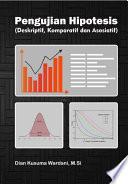
Statistik I
Statistik Deskriptif untuk Penelitian
Statistik digunakan dalam semua bidang ilmu. Pengembangan bidang ilmu yang dilakukan didasarkan pada bahasa ilmu pengetahuan yaitu bahasa, statistik, dan matematika. Buku ini ditulis dalam rangka melengkapi literatur perkuliahan Statistika untuk seluruh program studi serta memperluas cakrawala wawasan bahan bacaan atau textbook tentang ilmu statistika. Konsep-konsep dasar statistika dan probabilitas berupa simbol-simbol matematis dijabarkan melalui contoh-contoh penyelesaian soal, sehingga setiap pokok bahasan dapat dipahami dengan mudah. Buku ini berisi pelajaran statistik yang setiap bab selalu diisi dengan pendahuluan untuk mengantarkan dan mengarahkan pikiran para pembaca guna memahami konsep yang akan dibahas, diikuti dengan penanaman konsep yang telah dibahas, mendalami konsep pada contoh soal yang disertai dengan pembahasan, dan dilengkapi dengan kasus untuk diskusi dalam evaluasi mandiri. Dengan demikian, setiap mengakhiri pembahasan pada masing-masing, para pembaca diharapkan telah memperoleh pengetahuan yang benar, lengkap dan mantap, serta mempunyai keterampilan untuk memecahkan persoalan yang dihadapi. Pada bagian belakang juga tersedia glosarium yang berguna untuk membantu pencarian konsep dan definisi-definisi penting dalam memahami isi buku ini. Buku yang terdiri dari 9 bab dengan perincian sebagai berikut: • Penelitian dan Statistika • Variabel Penelitian dan Skala Pengukuran • Distribusi Frekuensi • Ukuran Pemusatan Data • Ukuran Penyebaran Data • Analisis Korelasi • Regresi Linear Satu dan Dua Prediktor • Analisis Data Berkala dan Peramalan • Angka lndeks
- ISBN 13 : 6230116421
- ISBN 10 : 9786230116421
- Judul : Statistik I
- Sub Judul : Statistik Deskriptif untuk Penelitian
- Pengarang : Dr. Sudaryono,
- Kategori : Mathematics
- Penerbit : Penerbit Andi
- Bahasa : id
- Tahun : 2021
- Halaman : 396
- Google Book : https://play.google.com/store/books/details?id=sn4-EAAAQBAJ&source=gbs_api
-
Ketersediaan :
Statistik digunakan dalam semua bidang ilmu. Pengembangan bidang ilmu yang dilakukan didasarkan pada bahasa ilmu pengetahuan yaitu bahasa, statistik, dan matematika.









